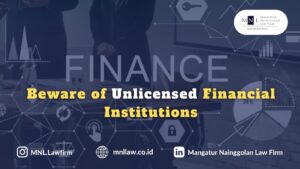
BEWARE OF UNLICENSED FINANCIAL SERVICES INSTITUTIONS
Placing funds (investments) in a financial services institution must be done selectively. Being tempted by high returns is permissible, but one must still pay attention to the security of the investment. Do not let the expectation of profit turn into loss. Let us be smarter in investing.
What is a Financial Services Institution?
Article 1 paragraph 10 of Law No. 4 of 2023 on the Development and Strengthening of the Financial Sector (“Law 4/2023”) defines a Financial Services Institution as an entity carrying out activities in the banking sector, capital markets, insurance, pension funds, financing institutions, and other financial services institutions under the provisions of statutory regulations in the financial services sector.
Furthermore, Article 1 paragraph 10 of Law No. 21 of 2011 concerning the Financial Services Authority (“FSA Law”) elaborates that other financial services institutions include pawnshops, guarantee institutions, the Indonesian Export Financing Agency, secondary mortgage companies, and institutions administering the management of compulsory public funds, including social security programs, pensions, and welfare, as regulated under legislation regarding pawnshops, guarantees, the Indonesian Export Financing Agency, secondary mortgage companies, and compulsory public fund management, as well as other financial services institutions subject to supervision by the Financial Services Authority (OJK) under statutory law.
Licensing Requirement for Financial Services Institutions
Every financial services institution, whether bank or non-bank, is required to obtain a business license. This obligation exists because financial services institutions conduct activities of mobilizing and distributing public funds. A license serves as the legal authorization ensuring that financial services institutions operate lawfully, transparently, and under regulatory supervision. The objective is to create a stable financial system and protect the interests of consumers of financial services institutions—primarily to prevent fraudulent practices that harm the public.
This is consistent with Article 16 paragraph (1) of Law No. 10 of 1998 concerning Banking, which states:
“Any party conducting activities of collecting funds from the public in the form of deposits must first obtain a business license as a Commercial Bank or Rural Bank from the Governor of Bank Indonesia, unless such activities are regulated under a separate law.”
Furthermore, financial services institutions that mobilize funds from the public without authorization may be subject to criminal sanctions. Article 34 of Law No. 1 of 2013 concerning Microfinance Institutions (“Law 1/2013”) provides that a microfinance institution that collects public funds without authorization may be punished with imprisonment for a minimum of one (1) year and a maximum of three (3) years, and with a fine of not less than IDR 50,000,000 (fifty million rupiah) and not more than IDR 1,000,000,000 (one billion rupiah).
Legal Remedies if Harmed by a Financial Services Institution
In principle, individuals harmed by the activities of financial services institutions may be categorized based on whether the institution is licensed or unlicensed.
For losses caused by licensed financial services institutions, the following remedies are available:
-
-
- Filing a Complaint to the Financial Services Authority (OJK) by submitting a chronology of events and attaching relevant evidence through the Consumer Protection Portal Application (APPK) of OJK or by sending a written complaint;
- Submitting a dispute resolution request through the Alternative Dispute Resolution Body for the Financial Services Sector (LAPS-SJK), pursuant to FSA Regulation No. 61/POJK.07/2020;
- Filing a civil lawsuit in the District Court for tort claims under Article 1365 of the Indonesian Civil Code (Burgerlijk Wetboek), or through consumer protection standing with a claim for damages.
- Additionally, the injured party may file a civil claim in the District Court for tort under Article 1365 of the Indonesian Civil Code, or through consumer protection standing with a demand for damages.
-
Conclusion
Financial services institutions that collect funds from the public must obtain authorization from the competent authority. If a financial services institution collecting funds lacks such authorization, it may cause harm to the public. Injured parties may then pursue remedies through criminal complaints to the police and/or civil lawsuits for damages.
Legal Basis
- Law No. 4 of 2023 on the Development and Strengthening of the Financial Sector
- Law No. 40 of 2014 on Insurance
- Law No. 21 of 2011 on the Financial Services Authority (OJK Law)
- Law No. 24 of 2004 on the Deposit Insurance Corporation
- Law No. 10 of 1998 on Banking
- Law No. 8 of 1995 on Capital Markets
- Law No. 7 of 1992 on Banking
- Indonesian Penal Code (KUHP)
- FSA Regulation No. 61/POJK.07/2020
Authors:
Muhammad Arief Ramadhan, S.H.
Dina Normanza Sibagariang
Editor:
Muhammad Arief Ramadhan, S.H.
